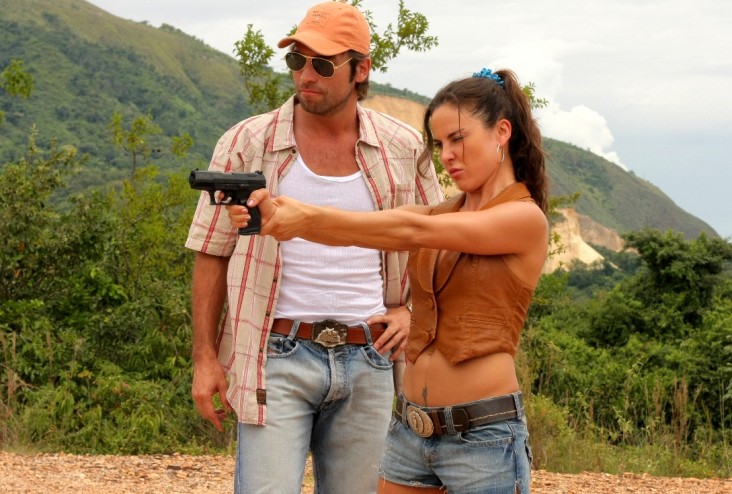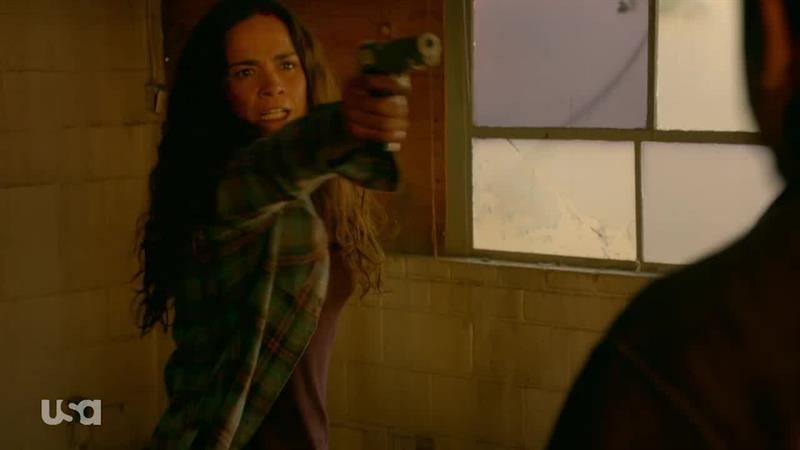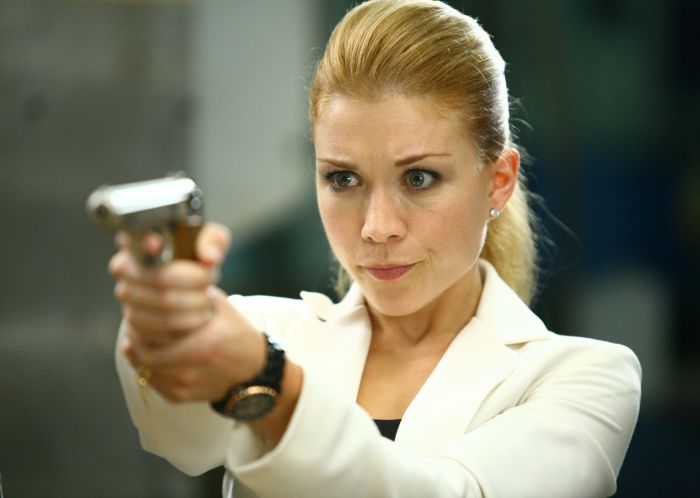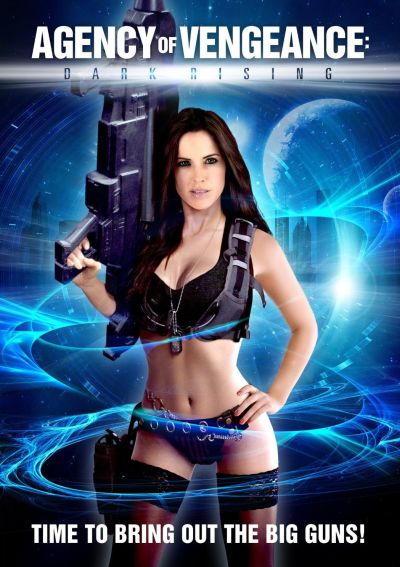
“She’s a woman in enemy territory. All women are in enemy territory for centuries, but in this case, this is particularly accentuated because the drug-dealing world is a very machista, hostile environment. Here, the survival of a woman in enemy territory is even more spectacular. That’s the original challenge of the novel — to ensure that in a machista, violent world, which is the territory of men — that in such a world where the women use the weapons of men, they use the intelligence and penetration of a woman. The challenge is for her to do more than what men do in those circumstances and for her to become the boss of men.”
— Arturo Pérez-Reverte
There have been two, significantly different televisual adaptations of Arturo Perez-Reverte’s novel, La Reina Del Sur (you can read our review of the source material here). The first, was a Mexican telenovela that ran for 63 episodes during 2011. However, this summer saw the premiere of an American television series based on the same novel, which played on the USA Network. This covered 13 episodes thus far, and finished its first run last month, with the network agreeing to a second season next year. Let’s take a look at both shows: their similarities, differences, strengths and weaknesses, starting with the Mexican version.
 La Reina Del Sur
La Reina Del Sur
★★★
“The reina in Spain, stays mainly in the plain.”
The impact of La Reina Del Sur probably can’t be exaggerated. Right from the first episode, screened in February 2011 on Telemundo, it was a smash hit. The premiere drew the network’s biggest ratings ever for a first episode, and perhaps surprisingly, the audience was almost equally split between men and women. The following week, viewers increased by almost 20%, and beat all English-language stations in the 18-34 demographic. The final episode, on May 30th, was the most-watched program in Telemundo’s 19-year history – and again, was watched by more men than any show on TV at the time. Though since surpassed, it was also the station’s most-expensive production, shot in five countries and budgeted at $10 million, So if you’re expecting cheesy drama, you’re going to be surprised – at least somewhat.
It tells the story of Teresa Mendoza, whose life is thrown upside down when her boyfriend, El Guero, is killed by the organized crime gang for which he has been flying planes. She trades his notebook to the head of the gang, Epifanio Vargas (Zurita), in exchange for her help escaping to Spain. There, she gets a job as a waitress in a brothel, and gradually works her way up to running the place’s books. She begins a relationship with a smuggler, and learns the ropes of the trade from him, only for tragedy to strike. While trying to out-run the authorities, their boat crashes into rocks, killing him and leading to her being sent to prison.
 In jail, she links up with Colombian Patricia O’Farrell (Urgel), who knows the location of a huge cocaine stash, hidden by her late boyfriend from the Russian mafia. On their release, the pair work out a risky deal with Oleg Yasikov (Jiménez) to sell it back, giving them the cash to set up in the drug business, with Yasikov’s help. However, this attracts unwelcome attention from two fronts. The DEA start sniffing around, with the help of the local cops. Potentially more lethally, Epifanio is now on the political rise, and Teresa’s existence represents an unwelcome loose-end that must be tidied up. Not least because the DEA are interested in getting her back to Mexico to testify against him.
In jail, she links up with Colombian Patricia O’Farrell (Urgel), who knows the location of a huge cocaine stash, hidden by her late boyfriend from the Russian mafia. On their release, the pair work out a risky deal with Oleg Yasikov (Jiménez) to sell it back, giving them the cash to set up in the drug business, with Yasikov’s help. However, this attracts unwelcome attention from two fronts. The DEA start sniffing around, with the help of the local cops. Potentially more lethally, Epifanio is now on the political rise, and Teresa’s existence represents an unwelcome loose-end that must be tidied up. Not least because the DEA are interested in getting her back to Mexico to testify against him.
According to del Castillo, the entire series was shot in just seven months, which is an extremely quick pace: it works out at more than two episodes, or over an hour of new footage, every single week. At one point, the star required medical treatment for exhaustion. Arturo Pérez-Reverte, author of the source novel (whose work also inspired Roman Polanski’s The Ninth Gate), helped extend the material, a very necessary task given the 63 episodes the show lasted. Not having read the book myself, I can’t comment on what was added, but having read Werner’s scathing review, seems like the telenovela is superior to the novel, and has certainly made its heroine a more sympathetic character.
The two areas where it works best are Teresa Mendoza’s character arc, and the supporting cast. With the story unfolding over such a long period (by English-language TV standards), the former kinda creeps up on you. It’s only near the end, when the show includes a number of flashbacks to what Teresa used to be like, that you realize how drastically she has been changed by events. The plucky yet naive young woman to whom we were initially introduced has gone, replaced by a thoroughly hard-bitten woman, She learns the hard way that trust and affection are traits that can get you – or your loved ones – killed in her chosen profession. Frankly, the trail of dead bodies left behind Teresa in one way or another, is so high, her belief she may be cursed begins to seem credible.
 I also liked the background characters. O’Farrell is a hard-drinking, coke-snorting, flagrantly bisexual party girl, yet still vulnerable and insecure at her core. She’s played by Urgel, who looks like a supermodel version of Brienne of Tarth, taller than most of the men on the show [Per Google, she’s officially 5’7″, but as this pic of her, del Castillo and male star Ivan Sanchez shows… someone’s not telling the truth] Another woman Teresa meets in jail, who becomes a key part of her team is Marcela, known as “La Conejo” (the rabbit). She looks like she wouldn’t say boo to a goose, but actually poisoned her husband and his mother. Alberto Jiménez, as Yasikov, seems to be channeling Lee Van Cleef. Finally, DEA agent Willy Rangel, shows up early, vanishes in the middle, then comes back to be pivotal at the end, drinking coffee from his Union Jack mug. Given this show is a marathon, not a sprint, having these to sustain interest is likely a necessity.
I also liked the background characters. O’Farrell is a hard-drinking, coke-snorting, flagrantly bisexual party girl, yet still vulnerable and insecure at her core. She’s played by Urgel, who looks like a supermodel version of Brienne of Tarth, taller than most of the men on the show [Per Google, she’s officially 5’7″, but as this pic of her, del Castillo and male star Ivan Sanchez shows… someone’s not telling the truth] Another woman Teresa meets in jail, who becomes a key part of her team is Marcela, known as “La Conejo” (the rabbit). She looks like she wouldn’t say boo to a goose, but actually poisoned her husband and his mother. Alberto Jiménez, as Yasikov, seems to be channeling Lee Van Cleef. Finally, DEA agent Willy Rangel, shows up early, vanishes in the middle, then comes back to be pivotal at the end, drinking coffee from his Union Jack mug. Given this show is a marathon, not a sprint, having these to sustain interest is likely a necessity.
It is disappointingly low-key in terms of action: Teresa’s first boyfriend teaches her to shoot, as shown above. But after using it to escape early peril, she doesn’t fire another round until the final battle. To be honest, even the efforts at generating tension are only sporadically successful, and this is more drama-than thriller-inclined. There are some moments of plotting which don’t ring true either. Apparently, in Spain, police procedure means than when someone confesses to having hired a hitman, you then let them wander off upstairs on their own to, oh I dunno, tidy up or something. Such mis-steps are likely inevitable at some point though. All told, I found it acceptably entertaining, with a lot less time spent on torrid romance than I expected, and anchored by del Castillo’s sound performance.
Finally, in a bizarre element of life imitating art, Kate del Castillo subsequently became involved with notorious fugitive Mexican drug-lord El Chapo, after Tweeting about him in 2012. Turns out he was a fan of La Reina Del Sur, telling her, “That series that you made, I saw it and I loved it. I’ve seen it many times—you’re a great actress in it.” He authorized Kate to begin work on a film version of his life story, before his break-out from jail in July 2015. Subsequently, she traveled to Mexico, along with Sean Penn, to meet El Chapo, a trip which Penn later chronicled in a heavily-criticized article for Rolling Stone. The relationship brought del Castillo scrutiny by the Mexican government, including an investigation for involvement in money-laundering. As of July, this was still ongoing…
Star: Kate del Castillo, Cristina Urgel, Humberto Zurita, Alberto Jiménez
 Queen of the South
Queen of the South
★★★★
“Don’t mess with Tex-Mexicans.”
 I’ll likely have less to say about the American version, because thus far, it has run barely 20% of the length of its predecessor, and tells far from a completed story. It is, however, radically different to this point in a number of ways. The most obvious is the shift in Teresa’s destination from Spain to the United States. This has caused some complaints among fans of the series and the novel, yet seems entirely understandable, given this is aimed squarely at the mainstream American market. While she’s still running from her boyfriend’s former employer, with a book containing a wealth of incriminating evidence, that information plays a more significant part here, becoming the McGuffin which drives the final third of the first season.
I’ll likely have less to say about the American version, because thus far, it has run barely 20% of the length of its predecessor, and tells far from a completed story. It is, however, radically different to this point in a number of ways. The most obvious is the shift in Teresa’s destination from Spain to the United States. This has caused some complaints among fans of the series and the novel, yet seems entirely understandable, given this is aimed squarely at the mainstream American market. While she’s still running from her boyfriend’s former employer, with a book containing a wealth of incriminating evidence, that information plays a more significant part here, becoming the McGuffin which drives the final third of the first season.
 The other major difference is one of focus. Teresa (Braga) has, to this point, not risen very high at all up the ladder of the drug business. There’s some obvious foreshadowing that she will, in that her “spirit animal” is an impeccably-dressed version of herself. But that appears well off into the future. For now, the real “Queen of the South” so far is Camila Vargas (Falcon). She’s the separated wife of Epifanio Vargas (de Almeida), who runs the American side of the business. She seizes an opportunity presented by Epifanio’s political campaign, and is working on going into business entirely on her own, dealing directly with the Colombian cartels. Needless to say, this does not sit well with her former husband, and when she discovers he is also after Teresa – no more than a low-level runner in her Dallas, Texas organization – her interest is inevitably piqued.
The other major difference is one of focus. Teresa (Braga) has, to this point, not risen very high at all up the ladder of the drug business. There’s some obvious foreshadowing that she will, in that her “spirit animal” is an impeccably-dressed version of herself. But that appears well off into the future. For now, the real “Queen of the South” so far is Camila Vargas (Falcon). She’s the separated wife of Epifanio Vargas (de Almeida), who runs the American side of the business. She seizes an opportunity presented by Epifanio’s political campaign, and is working on going into business entirely on her own, dealing directly with the Colombian cartels. Needless to say, this does not sit well with her former husband, and when she discovers he is also after Teresa – no more than a low-level runner in her Dallas, Texas organization – her interest is inevitably piqued.
So far, it has not been at all interested in romance, unlike LRdS, where Teresa’s various boyfriends and entanglements were a significant part of the show. This may develop down the road: for now, US Teresa has been too busy trying to survive. Likely as a consequence, she has also directly slain more people than Mexi-Teresa at the same point. The first came as the result of a drug deal/heist gone bad, and you could make a good case for self-defense. The killings in the final episode, however? Not so much. I sense she’s going to be considerably more “hands on” than LRdS, where Teresa delegated all the dirty work to her minions [I may be wrong, but I don’t recall her killing anyone personally until the shoot-out in the final episodes]
Where Queen really scores, however, is in its production values. Despite the solidity of the performances, Reina always felt like a soap-opera: largely enclosed in its sets and constrained by a budget that, while unprecendented by telenovela standards, was still low by comparison to American TV. That isn’t the case here: at its best, this even goes beyond television and has a cinematic feel, comparable with the likes of Traffic or Sicario. I particularly liked the use of music, which was certainly a lot more appropriate than the jaunty Norteño awfulness which permeated LRdS. [I should point out, my tolerance for country & western is equally low!] The electronic beats used here instead, felt a bit reminiscent of Miami Vice, or perhaps Giorgio Moroder’s work for Scarface, both of which are certainly relevant.
It’s a grittier version of the drug life too. In LRdS, you largely felt one or more degrees of separation from the harsh realities involved, with the drugs almost an abstract construct. There’s no such escape here, right from the opening episode when a drug mule has the packages she’s carrying burst in her stomach, with fatal results. But the biggest ace the show has so far is Vargas – a character not present at all in Reina, and neither in the book as far as I can tell. She’s part chess player, part grim reaper, with a voice which sounds like honey being slowly poured over sopapillas. She’s a fascinating, complex creation, beautifully portrayed by Falcon, and we’d have happily watched an entire series focused entirely on her.
Certainly, it’ll be interesting to see where the story develops from here. The first season ended with Epifanio ascending to the governorship of Sinaloa, and immediately exercising his new-found power, calling in the military against the cartel his ex-wife had just taken from him. Meanwhile, Teresa suffers a heart-breaking personal loss, yet rises above it to tell Camila, “I don’t work for you any more.” And, to nobody’s great surprise, there was a shock final twist, revealing something which wasn’t all that much of a shock, Reina having prepped me for it (albeit, a lot later there than in episode #13). None of which diminished my interest in the next season, slated for summer 2017. While fans of the telenovela may choose to differ, I think any neutral would likely agree that this is a more polished and effective rendition of the story.
Star: Alice Braga, Veronica Falcon, Peter Gadiot, Joaquim de Almeida












 This has more than slight echoes of the Female Ninjas, Magic Chronicles series, sharing the feudal setting, along with similar… unconventional attack forms by the protagonists. That’s unsurprising, since both are apparently based on Ninja Tsukikagesho, by Yamada Futaro. And, just to confuse matters further, the IMDb states that part 6 of FMMC shares the title here. Whether this might be the IMDb getting confused, I can’t say. I wouldn’t blame them if so, because the entire plot here is more muddled than enlightening. It takes place in the 1730’s, when Shogun Yoshimune and his deputy, Muneharu, were struggling for control. As a way of fomenting dissent by embarrassing him, Muneharu drags out the Shogun’s former concubines; to stop this, Yoshimune sends a group of his top female ninjas, under Tsurugi (Abe), to kill the women before Munharu’s men can get to them, triggering a ninja war. Complicating matters, turns out one of the concubines may have had a bastard son by Yoshimune, and whoever gets proof of that lineage will really hold the whip hand.
This has more than slight echoes of the Female Ninjas, Magic Chronicles series, sharing the feudal setting, along with similar… unconventional attack forms by the protagonists. That’s unsurprising, since both are apparently based on Ninja Tsukikagesho, by Yamada Futaro. And, just to confuse matters further, the IMDb states that part 6 of FMMC shares the title here. Whether this might be the IMDb getting confused, I can’t say. I wouldn’t blame them if so, because the entire plot here is more muddled than enlightening. It takes place in the 1730’s, when Shogun Yoshimune and his deputy, Muneharu, were struggling for control. As a way of fomenting dissent by embarrassing him, Muneharu drags out the Shogun’s former concubines; to stop this, Yoshimune sends a group of his top female ninjas, under Tsurugi (Abe), to kill the women before Munharu’s men can get to them, triggering a ninja war. Complicating matters, turns out one of the concubines may have had a bastard son by Yoshimune, and whoever gets proof of that lineage will really hold the whip hand. This makes a great deal more sense when you realize it’s actually a sequel, not only to Cymek’s earlier Dark Rising, but also the TV series that followed. The US/Netflix title and blurb cunningly manage to avoid mentioning this, which certainly explains the sense that you have walked into the middle of a story. For instance, none of the characters are apparently fazed by the fact that interdimensional portals have opened, allowing all manner of icky creatures to enter this Earth’s realm from a “Dark Earth”. It’s up to the Rising Dark Agency, a Government department [apparently staffed by about six people] to keep the resulting mayhem in check. Chief among its operatives are Jason Parks (Cannon, a dead-ringer for Dolph Lundgren) and Summer Vale (Kingsley, also the director’s wife), whose combination of human and demon DNA you have probably noticed on the poster. And are perhaps still staring at.
This makes a great deal more sense when you realize it’s actually a sequel, not only to Cymek’s earlier Dark Rising, but also the TV series that followed. The US/Netflix title and blurb cunningly manage to avoid mentioning this, which certainly explains the sense that you have walked into the middle of a story. For instance, none of the characters are apparently fazed by the fact that interdimensional portals have opened, allowing all manner of icky creatures to enter this Earth’s realm from a “Dark Earth”. It’s up to the Rising Dark Agency, a Government department [apparently staffed by about six people] to keep the resulting mayhem in check. Chief among its operatives are Jason Parks (Cannon, a dead-ringer for Dolph Lundgren) and Summer Vale (Kingsley, also the director’s wife), whose combination of human and demon DNA you have probably noticed on the poster. And are perhaps still staring at.